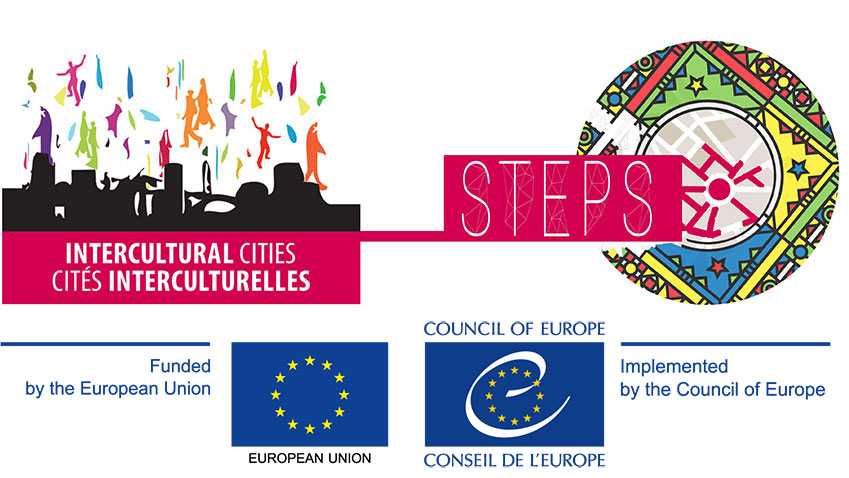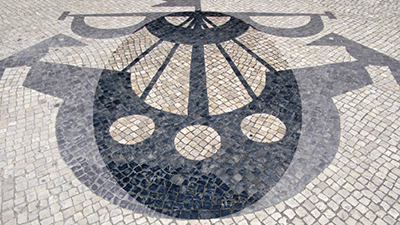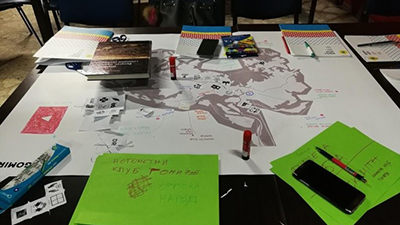Patrimoine culturel et diversité : projet STEPS

Heritage is implicated in the complex social processes in which people – individuals or communities – identify those things that are of value to be passed over to future generations. These include practices and traditions, as well as the web of meanings that reinforce the ideas of belonging and communality and are part of place-making.
Previous experiences carried out by the Council of Europe (in particular through Intercultural Cities and the work of the Faro Convention) demonstrate that cultural and social activities – festivals, events or just day-to-day recreational experiences and practices – provide occasions for interactions with people with a different background and, not only enhance community pluralistic identity, but also reinforce the closely intertwined relationship of the community with the broader environment.
To test how cultural heritage could be mobilised to build and strengthen community cohesion, promoting trust, dialogue and mutual understanding across diverse societies, the European Commission and the Council of Europe partnered on a pilot project – STEPS.
STEPS promoted the idea of participatory mapping of cultural heritage, where members of the community were given the role to identify those material and immaterial cultural assets that are a reflection and expression of their constantly evolving values, beliefs, knowledge and traditions.
The project’s theoretical framework was based on the idea that sense of belonging is fostered by:
- recognition and inclusive representation;
- improved democratic participation and social inclusion of all participants in negotiating the meaning and making decision about the common cultural heritage;
- negotiation of a shared vision for the future of the community accommodating pluralistic voices.
Through participatory mapping, community members collectively create visual inventories of their own community’s assets. They negotiate what can be listed in the inventory. This results in a map of those heritage assets that make up the pluralist identity of the community. Assets can include built, as well as intangible heritage features (traditions, practices, knowledge and expressions of human creativity), anything that people who live and work in the territories feel it is significant to them, in line with the Faro principles.
This process facilitates an understanding of what these features mean to individuals and how they impact each other. Moreover, the group gains insight into the specific value granted to community assets by different community members.
The cities of Rijeka (Croatia) and Lisbon (Portugal) were chosen in 2017 to pilot this methodology to map shared cultural heritage, and to demonstrate how a local intercultural approach to heritage sector focusing on the idea of place making can allow a city to actively open up the urban identity to all communities, thus increasing trust, mutual recognition, interaction and ultimately social cohesion through an identity inclusive to all.
As a result of the testing a step by step methodology has been developed and validated by all the partners.
How did STEPS work?
STEPS was not a regeneration project, it rather focused on providing expertise and guidance for the participatory process to mobilise diverse heritage as a resource for community cohesion in a specific area of the city where an action – either related to urban regeneration or to community development, is already planned.
 PARTICIPATORY HERITAGE MAPPING
PARTICIPATORY HERITAGE MAPPING
The methodology of Participatory Asset Mapping was adapted for use in relation to diverse cultural heritage. Participatory Asset Mapping is a process where community members collectively create visual inventories of their own community’s assets on a map. The key to Asset Mapping is survey the human and physical assets of a given place.
The focus on heritage resulted in a map of those heritage assets that make up the pluralist identity of the community. Assets could include built, as well as intangible heritage features (traditions, practices, knowledge and expressions of human creativity), anything that people who live and work in the territories feel it is significant to them, in line with the Faro principles.
This process facilitated an understanding of what these features mean to individuals and how they impact each other. The group gained insight into the specific value granted to community assets by different community members.
The participatory mapping was done through social investigation, a broad term that encompasses many different methods of gathering community knowledge through a community-engaged approach. With Social Investigation, community members will collect and map information on an individual basis, which was later combined. This method differs from traditional information gathering methods in that it focuses on gathering information directly from people and communities, instead of about people and communities (from secondary sources). Widely recognised and used methods of social investigation include interviews, surveys, and community walks.
 POLICY BRIEF
POLICY BRIEF
A final publication was elaborated as a reference for implementing projects with a focus on cultural heritage as a strategic asset for social cohesion. The policy brief encompassed the outcomes and lesson learnt during the implementation of the projects.
Resource pack

- How to shape a Participatory process to map Shared Cultural Heritage (EN)
- Kako oblikovati proces sudjelovanja u mapiranju zajedničke kulturne baštine (CR)
- Como modelar um processo participativo para inventariar o Património Cultural Comum (PT)
- Cómo forjar un proceso participativo para realizar una cartografía del patrimonio cultural común (ES)
- Come strutturare un processo partecipativo per realizzare la mappatura del patrimonio culturale condiviso (IT)
Lisbon's Experience

The participatory mapping process was initiated by the Department of Social Rights of the Lisbon Municipality (together with a strong partnership involving actors on the ground) to create and facilitate opportunities for migrant community members to participate as active agents to shape the common narrative of the neighbourhood, as well as to create an opportunity to foster interaction between different stakeholders and representatives of various communities.
Furthermore the process was aiming at strengthening the impact of the Gabinete de Apoio aos Bairros de Intervenção Prioritária - GABIP (Support Office for Priority Intervention Neighbourhoods) which was created in the Almirante Reis Borough to counteract the unregulated growth, matched with overwhelming increase in tourism and gentrification that was putting the social fabric of the neighbourhood at risk. The participatory mapping process therefore was felt as both a way to nurture interactions between long term/majority Portuguese and migrant background communities and to address the lack of social practices that merged distinct cultural heritages or regularly brought together people with different backgrounds.
Rijeka's Experience

The participatory mapping process was initiated by Rijeka 2020, the agency jointly founded by the City of Rijeka and the Primorje-Gorski Kotar County, for the purpose of planning and managing the programme of the European Capital of Culture 2020.
The process goal has therefore fit in the general goal of the European Capital of Culture to strengthen local communities by developing interpersonal relationships and increasing the frequency and qualities of cultural activities where people can come together.



